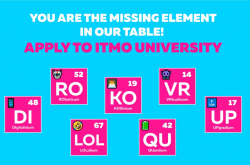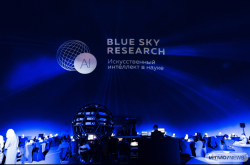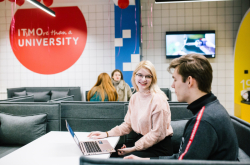On participating in the Baltic Research Contest
I've known about the contest for quite a long time, as I have been studying at the Laboratory of Continious Mathematical Education based in school #564 for some time. The laboratory bills itself as a beacon for young scientists — I got my Math skills there. For a couple of times, I've participated in organizing the Baltic Research Contest as a volunteer, but all they ever let us do was some manual labor. Yet, this year a group of former students, myself included, are gathering funds on Boomstarter in support of the contest — the money will be spent on accommodating the participants who will come to BRC in the beginning of February.
Last year, I presented my project in the Mathematics section. I've always been interested in algebraic problems, including unsolved ones. Still, the point of the contest is not to promote science to school students, but to teach them to present their ideas to both experts and amateurs. What is more, the contest is like a rehearsal of some big conference, as during your free time you don't idle near your stand, but try to learn what other research were presented, even in other sections. This thirst for knowledge is fundamental to the event.
I plan to continue doing research at ITMO University, though I still haven't chosen a field. During my last year at school I decided to take up optics, though I've always thought of becoming a programmer. The decision was spontaneous, but I never regretted it. It's really fun here — and I'm talking not only about the students, but the lecturers as well.

On his project
The project I presented at BRC and then at Intel ISEF was called "The Group Commutator Length in Terms of Group Ring". The algorithms for calculating commutator lengths have been known for a long time, but they are quite slow. Many mathematicians study how to improve them. Most calculate commutator lengths within a group, but this process is labor-intensive. My idea was to replace groups with group rings. If there is multiplication in a group, it is not necessarily commutative: A multiplied by B is not necessarily the same as A multiplied by B. This is inconvenient. I used group rings with multiplication, but that had composition as basis, and composition is always commutative: A plus B is always equal to B plus A. If we can represent some elements using such structures, we can group them as we want to, and this speeds up the algorithm. While studying this problem, I and Pavel Stolikov, with whom I worked on the problem, learned to send elements from groups to group rings. The question that remained is how to return them. I presented attempts to answer it at the Intel ISEF, as well. The whole of our project is original, though we've used some theoretical basis.
Calculating commutator lengths can be applied in different fields: in essence, commutator length is some sort of algorithm. A similar line of reasoning can be applied to a different environment — which means this algorithm can be applied to solving other math problems.

On participating in Intel ISEF
In 2016, the fair took place in Phoenix, Arizona (USA). Teams of school students from all over the world went there. The judges were real professionals. Surely, sometimes we were approached by those who know much about graphs, for instance, but not commutator lengths. Sometimes we were approached by non-technical specialists, which was naturally a lot more problematic -it is hard to explain the importance of your project to such people. Yet, if someone becomes interested in it, they bring you the specialists who can appreciate your project to its fullest. As for my project, the jury didn't find any essential mistakes in it.
The atmosphere at the contest is great. You can meet lots of other people from different countries and it’s nice sometimes when you stumble upon those who speak the same language. Everyone is happy and enthusiastic so it makes you feel comfortable. The hard part is presenting in front of the judges. They can ask a lot of difficult questions but they are interested in your development and this is important to keep in mind. The day you have to present before the judges is the most challenging so it’s important to be prepared, to get a good night’s sleep so that you can be bubbly and enthusiastic about your project on the day. The important thing is to believe in yourself and use this as a platform for development!
The Baltic Research Contest is conducted annually, and gathers the most talented students from Russia, Belarus, Kazakhstan and Ukraine. ITMO University is one of the contest's key partners. Last year, 335 participants presented their projects in eight subject areas: mathematics, physics, chemistry, biology, ecology, programming, engineering and robotics. This year, the list of subjects will remain the same.





